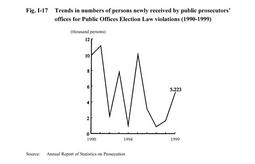| Previous Next Index Image Index Year Selection | |
|
|
6 Elections Fig. I-17 shows trends in the number of persons newly received by public prosecutors'offices for Public Offices Election Law violations over the last ten years.
The number of persons received for Public Offices Election Law violations is greatly affected by whether there have been elections in the year in question, and if so, their type, and so on. The number of persons received was higher in 1990, 1991, 1993, and 1995. This was because General Elections for the Upper and Lower Houses of the Diet were held in February 1990 and July 1993, and simultaneous local elections in April 1991 and April 1995. However, in 1998 (when a General Election was held in August)the number of persons received was 3,190, far less than the 7,707 when the previous General Election was held in 1993. Similarly, in 1999 (when simultaneous local elections were held in April) the number was 5,223. This was 3,595 more than in the previous year, but significantly less than the 10,015 when the previous simultaneous local elections were held in 1995. According to Criminal Statistics by the National Police Agency, viewing the number of persons cleared for Public Offices Election Law violations in 1999 by the nature of the violation, by far the most common were bribery and inducement of interests, followed by fraudulent registration, fraudulent ballots, and other violations of documentation systems. Meanwhile, the Partial Amendment of the Public Offices Election Law that came into full effect in December 1995 has strengthened the so-called complicity regulation(whereby election candidates are held jointly responsible for election law violations by campaign managers and others). Since the amendment, public prosecutors have filed proceedings in 65 cases for conducting an invalid election related to complicity. Of these, guilty verdicts have been reached in 62 cases(as of June 16th, 2000). Moreover, in a breakdown of the 65 cases filed by public prosecutors, 20 resulted from the simultaneous local elections held in April 1995, 10 from the General Election held in October 1996, 1 from the by-elections for the Upper and Lower Houses held in February 1998, 19 from the simultaneous local elections held in April 1999, and 15 from other local elections. In terms of their content, 11 cases were filed for conducting an invalid election and prohibition of candidature, and 54 for the latter alone. Meanwhile, viewing the 105 persons subject to complicity regulations in terms of their personal status, 30 were family members, 7 were secretaries, and 69 were organizational election campaign managers and others(source:Criminal Affairs Bureau, Ministry of Justice). The total exceeds the number of persons because some of them came under more than one status heading. Fig. I-17 Trends in numbers of persons newly received by public prosecutors'offices for Public Offices Election Law violations (1990-1999) |
